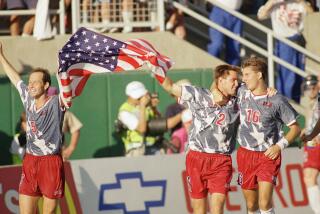Youth Charity Founder Lives Up to Heritage
- Share via
SAN DIEGO — Sami Bandak was born in Bethlehem to a father named Jesus who not only came into the world on Christmas Day but also was a carpenter by trade. To complete the sequence, Bandak’s grandmother was named Mary.
The Escondido-based importer of luxurious Swedish strollers and baby carriages doesn’t quite credit these facts of his heritage for his decision to help young people reconstruct their lives, but he doesn’t quite discount them, either. Above all, he says that his family tree provided him with roots deep enough to spread through a special and not always well-served segment of San Diego County.
Bandak, who as the sole distributor in the Western Hemisphere of Emmaljunga perambulators might be said to make his living from supplying youngsters’ needs, founded a novel program called Futures for Foster Adolescents a year ago. The idea, a simple yet radical solution to the special problems encountered by foster youths when they reach the age of 18, has been well received locally and, according to Bandak, will soon spread across the United States.
The national kick-off will be aided, by actor-and-educator Bill Cosby, who has endorsed the program and will headline the entertainment at “Building Futures,” the 1992 version of the Coming Together Foundation’s gala, to be given Oct. 23 at the San Diego Convention Center. Other youth-oriented charities will share in the proceeds--Bandak originally founded the event as a fund-raiser for the Palomar Family YMCA--but “Building Futures” is intended primarily to foster the chances of Futures for Foster Adolescents.
According to Bandak, FFA serves youths “who can’t afford to experience another failure.” The program deals with the unique situation faced by foster youths, namely the fact that at the age of 18 they lose their status as wards of the court and frequently lose their homes as well. “That’s a young age to be out on your own,” Bandak said.
*
To prepare these teens for their transition to adult status and self-reliance, FFA places them at the age of 16 in specially selected part-time jobs. The obligations for the youths are few but significant: They must agree to finish high school and must attend periodic self-esteem meetings.
The jobs themselves may be ordinary, but the circumstances are not because each employer, always a medium to large business or corporation, assigns a trained mentor to each youth. That person’s job is to guide the youngster through the world of work and, if possible, help determine a career path. In addition, each employer agrees to furnish the youngster with a full-time, entry-level position upon high school graduation, or with summer internships should the teen choose to attend college.
Motivations for the businesses include a tax credit for each youngster they hire, but also an opportunity for involvement that some of them have been seeking, according to Bandak, who is of the opinion that more businesses should look in his direction.
“Corporations can no longer get by with just writing checks to their charities,” he said. “Society has to take a positive step forward to solve its own ills. Non-involvement will mean devastation; I guarantee it.”
Bandak also said that he regards FFA as a hand-up rather than a hand-out. “There should not be a separation between those youths who have the opportunity and resources to succeed and those who do not. This program gives them that opportunity.”
For those youths who do decide to pursue higher education or vocational training, the Coming Together Foundation provides scholarships as well as money for clothes, transportation and other school expenses. The goal to make these young people self-supporting is never forgotten, however, and Bandak said the employment program achieves this result.
“We started with four kids and we’re up to 28 now,” said Bandak, who described the program as “99% successful. We’ve had only one problem so far, and sometimes we just can’t control a problem. We want to expand to include as many children as possible, and when we started I hoped to put 100 kids to work right away. That wasn’t realistic because FFA takes a long time to work. However, we’re creating a cycle so that the kids in FFA today can become sponsors of other kids in the future.”
Bandak added that his aim is nothing less than to cure a recurring malady in American society.
“These youngsters could produce generations of welfare recipients, but we help them become responsible taxpayers. We build futures for these kids, and we ask them to please come back, when they’re successful, to work with the younger kids at the prevention stage. We want to stop a negative cycle and instead empower these kids to be strong, decent individuals.”
Bandak was born in 1945 to a Christian Palestinian family living on the West Bank, which now is in Israel. When he was 14, his father, Issa (the name is the Arabic form of Jesus) moved the family to Delaware. A fairly typical American youth followed, including sojourns at a sufficient number of universities to earn a bachelor of arts degree. Business dealings in the Middle East led by a circuitous route to Sweden, where he established himself as the American representative of the Emmaljunga stroller manufacturers. His wife, Marie, remains a Swedish citizen; the couple have three children together (Bandak has a fourth from a previous marriage) and have lived in Escondido since 1984.
Bandak intends to take FFA nationwide “when we have it perfected in San Diego” and said public officials in several California counties, in Kansas and in the District of Columbia have expressed interest in the program.
Currently, about 50 corporations are associated with FFA, either directly in the program or through financial support. The roster includes several major San Diego names, including Jack-in-the-Box parent Foodmaker Inc., the Lusardi Construction Company and Fornaca Family Bakery.
Ever since he entered the fund-raising circuit, Bandak has been regarded by insiders as something of a maverick and a phenomenon. None of his events have been modest in scope, by any type of measurement, each boasting a sizable, prestigious attendance, big-name entertainment and hefty net proceeds. The foundation’s two previous benefits have earned about $150,000 each, and Bandak hopes for a figure approaching $250,000 from his even more ambitious event at the Convention Center.
*
“Two years ago, I decided I wanted to involve Bill Cosby,” he said. “My friends thought I was crazy, but a mutual friend showed him the FFA program, and soon after, Cosby called to arrange a meeting.”
The actor will donate his appearance at the event and endorses FFA in a letter sent to major corporations to solicit their involvement in the program.
Bandak credits his father with creating the opportunities for him that he now attempts to offer others.
“My father gave me his energy and creativity. He made my life golden.”
More to Read
Sign up for Essential California
The most important California stories and recommendations in your inbox every morning.
You may occasionally receive promotional content from the Los Angeles Times.










